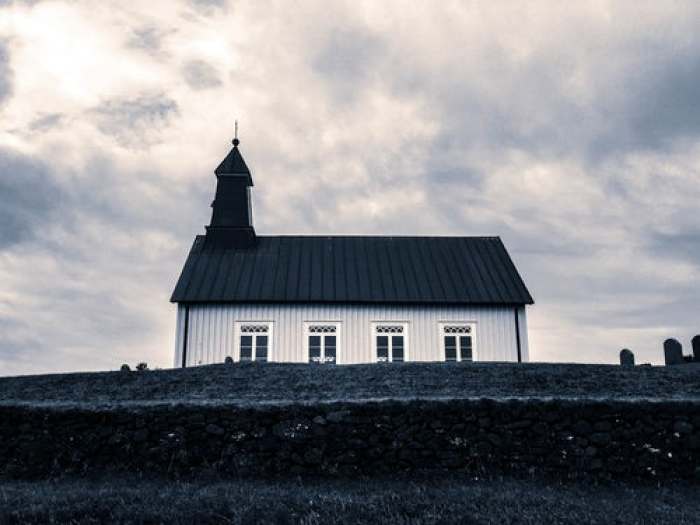Making the church essential again

It was Easter Sunday morning, and being that I’m a pastor, I was sitting in my office, getting ready to preach, looking over my notes at my desk, when suddenly, I just paused from looking down at the papers in front of me and looked out toward our fellowship hall and realized how quiet and empty it was in our building.
This was Easter Sunday morning, the busiest and nosiest day of the year for the typical church in America, and here I was, sitting in my office, alone, with total, almost eerie quiet. I half expected Rod Serling to come out and tell me that I had just entered The Twilight Zone. But I think it was at that moment when it really, fully dawned on me, just how surreal this whole pandemic church shutdown has truly been.
Never in my wildest dreams did I ever imagine pastoring virtually, seeing our doors shut to the public, and preaching regularly to an empty sanctuary. Yet the last two months, I believe, have also been one of the most exciting and unique opportunities God has given the church in our lifetime, to have a real needed show stopping, plan interrupting, rude awakening, time of reflecting on who we have been in light of who we are, and what we should be doing instead of what we, largely, have been doing.
As the scale of the virus became clear, and states around the nation began shutting down all aspects of society in an effort to curb and contain the spread of this highly infectious contagion, I didn’t think much of the term, non-essential relating to churches as anything other than the official government term for a business or organization that is not deemed as providing “life-sustaining” services that are “critical for a functioning society.”
But perhaps there is a larger spiritual significance to being designated this term, that we should think about. To be clear, I have been personally supportive of following the health guidelines given to us, fully understanding why houses of worship were deemed unsafe to host in-person gatherings and our church has been able to weather this storm through staying connected virtually.
The unprecedented public health crisis required unprecedented action, though there are understandable concerns and debate about those actions. Yet I would put forward that, as a result of this health crisis, we have the chance to face the music of an unprecedented spiritual crisis that has been building for decades facing the Church in America: Becoming irrelevant in our society
We have come a long way in our country and society from the observations of Alexis Te Tocqueville, a 19th century French Politician who penned, Democracy in America, and observed, “There is no country in the world where Christianity has greater influence over the souls of men than in America.”
We have come a long way from the church being seen as the epicenter of communities, or from pulpits as being considered the megaphone that would shape a generation or from Christianity influencing the culture around it, rather than the culture influencing Christianity.
Long gone are the days of Blue laws that encouraged Sabbath rest and worship, of church involvement and participation being a priority for the average American. And if statistics are any indication, our window to reaching the next generation for Christ might soon be gone as well.
“The Church put itself on the non-essential list a long time ago,” Bishop Patrick Wooden said in a viral sermon recently, and I believe there is a lot of subliminal truth to that, and I believe the cause is becoming neglectful with what should be essential.
As Jesus was preparing to face His sacrificial death on the cross, He prayed in John 17 for the church that would represent His name to the world and there are three things he mentioned that are essential for the church to practice to truly be the beacon in a dark world that it is meant to be: unity, love, and truth, and sadly and tragically, we tend to lack at least one of these pillars, and the world is noticing.
The political tribalism, ideological chasms, racial and economic barriers that divide in our society that should be brought down by the cross of Jesus are often being further exasperated among fellow Christians. Instead of being known for love, we are often known for coming across as judgmental, self-righteous, and known more for what we are against, than for what we are for, having an ‘Us’ vs. ‘Them’ mentality that fails to see people we mean to reach with the compassionate lens through which Christ willingly died for.
"I want the truth!” yells Tom Cruise, to which Jack Nicolson responds in the classic scene from, A Few Good Men, “You can’t handle the truth!”
Unfortunately, it seems many pulpits can’t handle it either, as the Gospel message of Jesus Christ is often not being fully and adequately proclaimed, settling for offering feel-good euphemisms as a substitute for the life-changing power that comes from the living and active Word of God.
The Church, by and large, chooses to play it safe with difficult issues that we are confronted with in our culture, opting to be silent on abortion, sexuality, racism, mental illness and other tough topics for fear of offending, forgetting that, as Dietrich Bonhoeffer, a pastor martyred by the Nazis, has been quoted as saying, “Silence in the face of evil is itself evil: God will not hold us guiltless. Not to speak is to speak. Not to act is to act.”
Our Silence is deafening.
As we prepare to reopen our churches across the country, we do so knowing that until the coronavirus is truly brought under control or altogether eradicated, we will not be able to do church the same way completely again, and maybe never. We will be practicing ‘social distancing,’ wearing masks, and having lots of hand sanitizers scattered and available for the foreseeable future.
But perhaps we could also adjust our approach in other areas that used to be essential. We could reopen with a renewed understanding that we, not the building we gather at, are the church and must be the church.
We could trade shallow religion for a daily substantive relationship with Christ. We could come back to a real reliance on the supernatural power of the Holy Spirit instead of looking first to artificial and human resources to attract and grow. We could engage with our culture rather than isolate ourselves from it. We can listen and dialogue rather than shout and unfriend. We could share the hope and comfort we have in Christ rather than keep it to ourselves. We can walk the walk and not just talk the talk. We can be known for sacrificial instead of common superficial love.
“Grace and truth came through Jesus Christ” (John 1:17).
We tend to be good at gravitating to either showing grace or speaking truth, but not so good at doing both. And yet Jesus Himself, we are told, came to this earth to bring us both grace, and truth.
The Church must show and share both because the world needs both. If ever the Church of Jesus Christ and the Gospel we represent and proclaim were “critically” needed to help our society function, it is now. If ever the church were truly ‘essential’ it is now.
The families who lost loved ones from COVID-19, the economic impacts being felt, the mental and emotional toll that many are feeling, the partisan gridlock of an election cycle looming, and the general uncertainty of what lay ahead with this virus provide followers of Christ with the greatest opportunity of a lifetime to provide much needed Good News to an audience, whose attention, until recently, we had been largely losing.
This is our time to Rise and Shine.
“You are the light of the world. A city set on a hill cannot be hidden. Neither do people light a lamp, and put it under a basket, but on a stand, and it gives light to everyone in the house. In the same way, let your light shine before others, so that they may see your good works and give glory to your Father who is in heaven.” (Matthew 5:14-16).
Pastor Stephen Mitchell is the senior pastor at Trinity Bible Church in Severna Park, Maryland. He is also the author of Taking A Stand In Our Dying Land and has spoken in various churches and retreats.




























